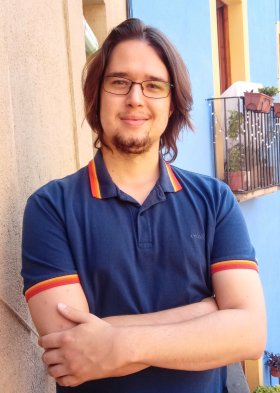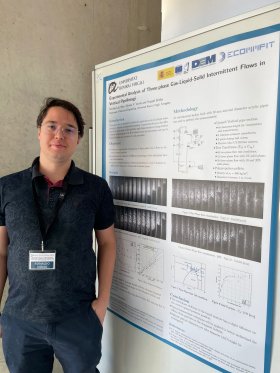Ronaldo Luís Höhn


PhD Programme: Nanoscience, Materials and Chemical Engineering
Research group: ECOMMFIT – Experimentació, Computació i Modelització en Mecànica de Fluids i Turbulència
Supervisors: Youssef Stiriba
Bio
Ronaldo Luís Höhn holds a Bachelor's degree in Mechanical Engineer, obtained at the University of Passo Fundo in 2017, and a Master's degree in Mechanical Engineer in the thermal and fluid concentration areas, obtained at the University of Campinas in 2021, both in Brazil. During his undergraduate, he worked as an industrial maintenance planner in two different companies and participated in a couple of research studies of computational fluid dynamics at the university. In his master's, he worked with Numerical Simulation of Two-phase Flows Oil-Water and Three-phase flow Gas-Oil-Water in horizontal pipelines and was a member of the Artificial Lift and Flow Assurance Group (ALFA).
Project: Experimental Analysis of Gas-Liquid and Gas-Liquid-Solid Flows in Horizontal and Vertical Pipes
Simulations and experiments of two-phase and/or three-phase flows in multiphase reactors are important for many industrial processes.For instance, the chemical, biochemical, or environmental industries. One of the most primitive, but nevertheless often used, reactor types for multiphase reactions are bubble columns. This kind of reactors have advantageous characteristics in mass and heat transfers and cause only low operation and maintenance costs due to absence of moving parts. In bubble column reactors, the gas phase is dispersed in the form of tiny bubbles in a continuous liquid phase using a gas distribution device. The complex interplay between operating conditions, the gas-liquid interfacial area, turbulence in the liquid phase, and bubble-bubble interactions lead to extensive range of flow regimes and complex flow structures. Besides, the liquid turbulence causes macro- and micromixing of the liquid reactants (i.e. the dissolved gas, the solvent or already dissolved species), whose local distributions are in turn decisive for the reaction rates. Several experimental of these types of flows have been carried out by using different measurement techniques depending on the considered configuration, e.g., pressure sensors, oxygen probes, or velocity measurements. New simulation models incorporte the turbulence of the liquid phase through the Reynold-Averaged Navier-Stokes (RANS) models or Large-eddy simulactions (LES) models. However, the exacts mechanism and mixing phenomena are sill unclear due to the lack of models and experimental information. Especially, the effects of physicochemical properties of the liquid phase like viscosity and surface tensions are poorly investigated. The main idea of the current investigation is close related to our proposal for a national project to be funded by the ministry of science and innovation, where an experimental set up is suggested to analyze absorption of CO2 in water in pipeline systems. It consists on an experimental setup of a bubble column reactor in our labs in Tarragona, which allow us the application of visualization and local measurement techniques available in our labs to obtain readily experimental information and, it will facilitate the analysis of the effect of a distributed gas inlet in the hydrodynamics and the associated mass transfer rates and chemical reactions. Further studies on fluid with different viscosities and surface tensions could increase our databank size. Additionally, numerical simulations could provide better knowledge of the flow structure and acting physical phenomena.
Finally, this setup can be used to analyze and measure dissolution rates of gas (CO2) bubbles.
Outreach activities
- European Researchers’ Night 2021: "Lava lamps".



